may-top.html
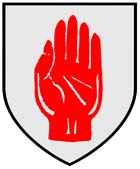 1562 Shane O’Neill, leader of the O’Neill clan, returned to Ireland on this day in 1562. He had been to see Queen Elizabeth to request her recognition that he had inherited the leadership of his clan after the death of his father. Shane was under threat from Brian O’Neill, who also felt he was entitled to the title.
1562 Shane O’Neill, leader of the O’Neill clan, returned to Ireland on this day in 1562. He had been to see Queen Elizabeth to request her recognition that he had inherited the leadership of his clan after the death of his father. Shane was under threat from Brian O’Neill, who also felt he was entitled to the title.
Queen Elizabeth accepted Shane’s request, on the condition that he submit to her rule and that of her deputies. However, in reality Elizabeth’s support was meaningless and Shane still had to deal with Brian himself. One of Shane’s followers killed Brian and he was replaced by his brother Hugh O’Neill. Shane successfully repelled the threat of Hugh, and then turned his efforts on forcing the Scottish clan the O’Donnells and the MacDonnells to accept his rule in Ulster.
Click here to read more about the history of the name O’Neil
Click here to read about the history of other Irish names
* * *
1650 Oliver Cromwell returned to England on this day in 1650. He left Ireland after leading a brutal invasion across the country which saw the seizure of several major towns and cities. Under his leadership, Cromwell’s army swept across Ireland in less than a year, and almost completely removed the Catholic presence. All Catholic priests were killed upon capture and Catholic landowners had their land confiscated and handed to English and Scottish Protestant settlers.
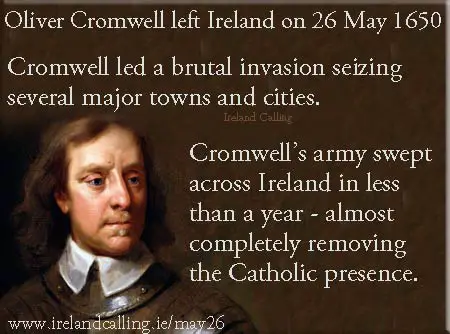 Cromwell returned to England to counter the threat of the return of King Charles II, who had landed in Scotland after having been in exile in France. Cromwell had to ensure that Charles was prevented from regaining power in Britain. However, Cromwell’s followers continued their invasion across Ireland for the next few years.
Cromwell returned to England to counter the threat of the return of King Charles II, who had landed in Scotland after having been in exile in France. Cromwell had to ensure that Charles was prevented from regaining power in Britain. However, Cromwell’s followers continued their invasion across Ireland for the next few years.
Click here to read more about Irish history
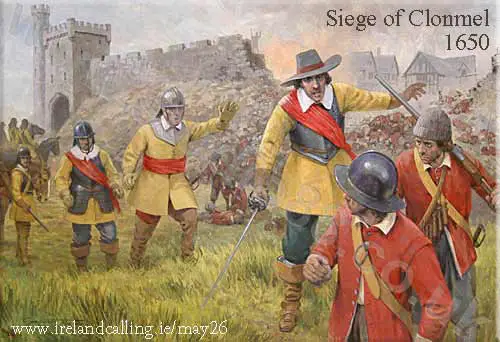 * * *
* * *
1798 The United Irishmen rebels of County Meath are defeated by the British troops at the Hill of Tara on this day in 1798. It effectively ends the active rebellion in the county. The rebels set up a camp at the top of the hill as it enabled them to control the main road into the county from Dublin.
However, although they heavily outnumbered their British opponents, at a ratio of around six to one, the rebels didn’t have the military weaponry to compete in battle and were easily dispersed. The British fired cannons and gunshots up the hill to kill hundreds of the rebels before they could even get close.
Those rebels who were not killed in the conflict, were captured and executed by hanging by the British.
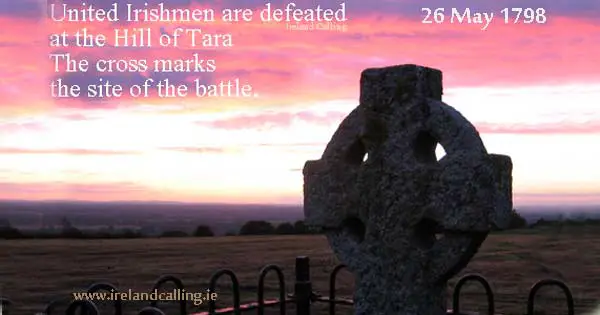
* * *
1868 Michael Barrett was executed on this day in 1868 outside Newgate Prison, London; the last person to be publicly hanged in England. Barrett was from County Fermanagh and as an adult he became an active member of the Fenian movement.
He was accused of the planting of a bomb outside Coldbath Fields Prison in London. The bomb was intended to destroy much of the prison walls to enable several Fenians to escape. However, the blast was far bigger than expected and it resulted in the death of 12 people living in the houses next to the prison.
Barrett was found guilty of the murders and sentenced to death. However, it was rumoured that he was framed for the crime because he was a known Fenian and the authorities had a dislike for him after he had been arrested in Scotland for possession of a firearm.
The case against Barrett was built around the evidence of a Dublin man, Patrick Mullany. Mullany had allegedly given false evidence in the past, and was bribed with a ticket to Australia to begin a new life. Barrett had witnesses who could confirm he was in Glasgow at the time the bomb detonated. The jury still found him guilty and he was sentenced to death by hanging.
In the dock Barret made a speech which was reported on by the Daily Telegraph newspaper the following day. Here is an extract of Barrett’s speech:
“I am far from denying, nor will the force of circumstances compel me to deny my love of my native land. I love my country and if it is murderous to love Ireland dearer than I love my life, then it is true, I am a murderer. If my life were ten times dearer than it is and if I could by any means, redress the wrongs of that persecuted land by the sacrifice of my life, I would willingly and gladly do so.”
Here is part of the report from the Daily Telegraph describing Barrett’s final few moments in court:
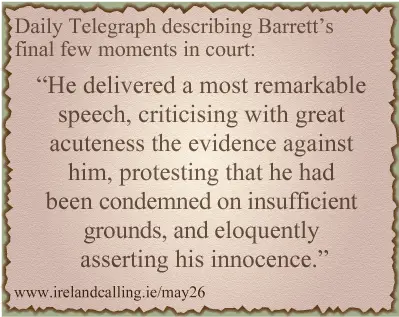
* * *
1897 Dublin writer Bram Stoker sees his novel Dracula published for the first time on this day in 1897. The book is not an immediate success with both reviews of the book and sales not overwhelming.
However, it has gone on to be one of the most famous pieces of fiction ever to come from Ireland. It has been performed on stage and onscreen by thousands of actors around the world, and is still in publication to buy as a book today.
Click here to read some of the best quotes from the Dublin-born author of Dracula, Bram Stoker
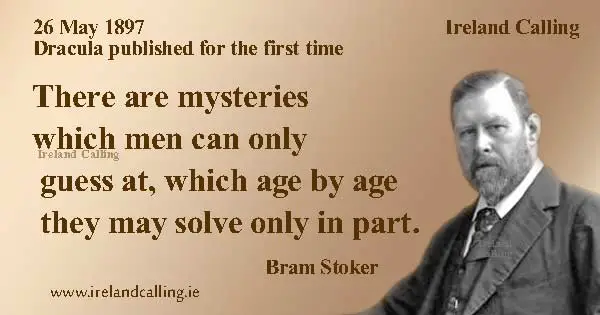
* * *
1979 Northern Irish motorcycle racer Tom Herron was tragically killed on this day in 1979. He was one of the top racers of his era and hold the record for the fastest speed of 127.63 mph on North West 200 track.
Tragically, that was the same venue where his life was cut short as he battled for first place in 1979 and lost control of his motorcycle. Herron died in hospital from the injuries he sustained in the crash.
Click here to read about more top Irish sports stars
may-bottom.html